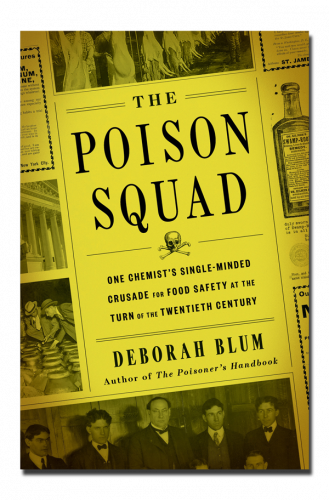Once known as “Dr. Wiley’s Law,” the Pure Food and Drug Act of 1906 was the first of many regulations that advocated for food safety and consumer protection in response to the use of harmful food preservatives—including formaldehyde, borax, copper, and arsenic. But who is Dr. Harvey Washington Wiley, and why is his work relatively unknown? MIT professor and toxicology journalist Deborah Blum investigated the scientist’s legacy regarding the complicated history of American food safety in her 2018 book, The Poison Squad: One Chemist’s Single-Minded Crusade for Food Safety at the Turn of the Twentieth Century.
Blum begins by tracking Wiley’s rise to prominence, starting as the first chemistry professor at Purdue University and rising to be the chief chemist in the U.S. Department of Agriculture (USDA) in 1883. An analytical chemist, Wiley devoted himself to purifying food products for the sake of consumers. Frustrated by suspected adulteration of food products and lobbyist interventions in the passage of many pure-food laws in late nineteenth century, Wiley assembled a group of about twenty young male volunteers in 1902 who became known as “the Poison Squad” because they ate foods suspected of containing poisonous additives to test their safety. “It’s an important moment where you have a federal scientist so desperate over the state of food safety that he’s willing to take a chance on poisoning his coworkers to make a case,” Blum said.
Blum emphasized the significance of Wiley as the first in the federal government to hire a science writer—an important step towards educating the general public about these complex and groundbreaking findings. By 1906, the Pure Food and Drug Act was passed and credited largely to President Theodore Roosevelt even though Wiley wrote most of the bill. Blum further discusses the misattribution of credit for this act to The Jungle by Upton Sinclair, a revelatory political fiction novel on the gruesome conditions of the meat industry. “However, Wiley was the main driving force behind it. He doesn’t have all the theater of The Jungle; he’s just a guy who slogged away at the trenches, trying to get a law passed,” Blum noted.
Blum’s book highlights the instrumentality of the Pure Food and Drug Act in setting a precedent for consumer rights. “It was the first time that the US accepted its role in the business of consumer protection, as opposed to their traditional stance on protecting big industries,” Blum said. These are implications that extend to us today, as we employ new labeling requirements in order to promote industry transparency. “Food safety and regulation is a matter we should care about. The average American has a right to have their government proactively protecting them,” Blum said. The Poison Squad covers a pivotal time in consumer rights history and offers an insightful commentary on the overlooked yet understated efforts of Wiley to advocate for food safety.

